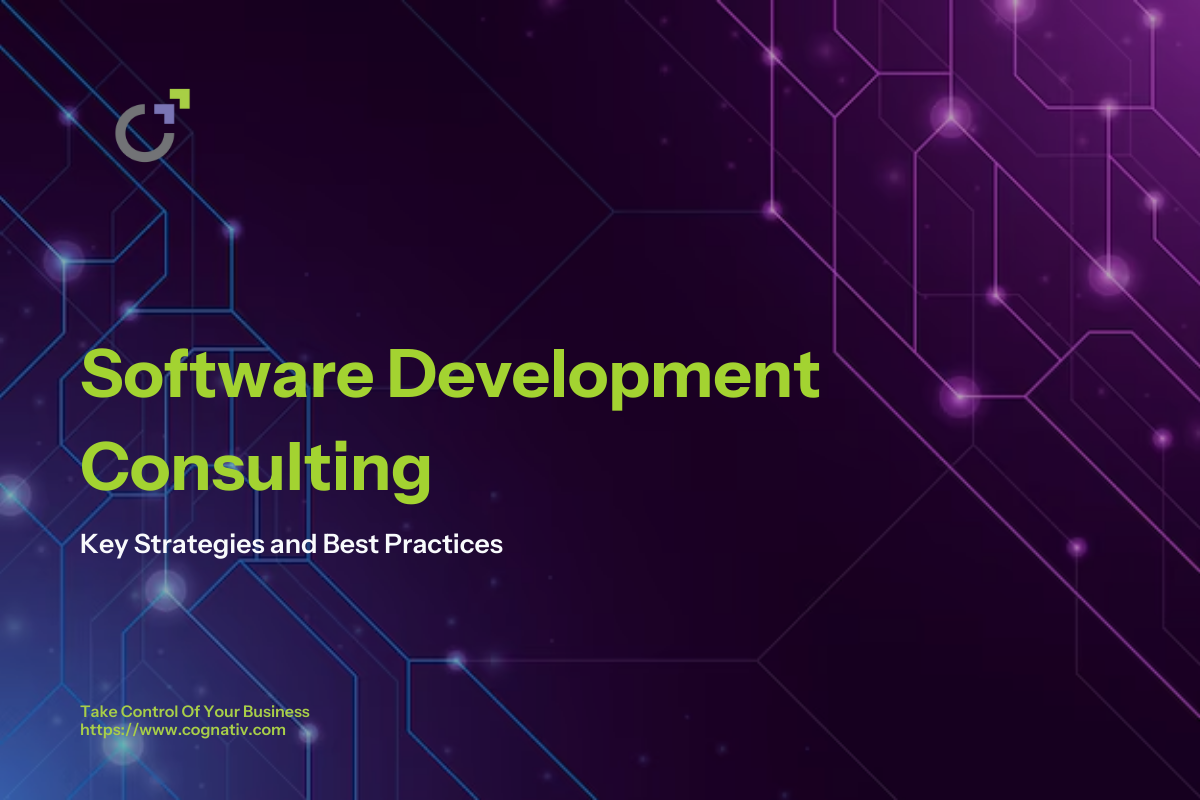

Monday, March 24, 2025
Kevin Anderson
Software Development Consulting: Key Strategies and Best Practices
Modern businesses increasingly rely on software development consulting to fill critical technical gaps, reshape outdated systems, and devise strategic approaches to building custom solutions. By partnering with specialized advisors or teams, companies can accelerate product launches, refine Agile practices, reduce costs, and integrate cutting‑edge technologies without overwhelming internal resources. Whether you’re exploring agile software development consulting or searching for a partner to modernize legacy software, a well‑chosen consulting firm helps navigate complexities and ensures successful project outcomes.
Below, we delve into essential tactics for choosing a software development consulting company, explore various engagement models, and tackle common questions such as “what are the top software development firms in IT consulting?” or “how do you ensure a consultant’s approach actually benefits your organization?” With insights into diverse solutions—from custom software development consulting to embedded software development consulting services—this guide outlines how to maximize consulting relationships and drive sustainable value.
Table of Contents
- What Is Software Development Consulting?
- Why Do Businesses Rely on Consulting?
- Engagement Models and Best Practices
- Core Services Offered by Consulting Firms
- Selecting the Right Consulting Partner
- Avoiding Common Pitfalls
- Frequently Asked Questions
- Conclusion

What Is Software Development Consulting?
Software development consulting involves partnering with experienced professionals who provide expert guidance and hands‑on support throughout the software lifecycle. Consultants work closely with organizations to plan, design, and execute custom software projects, ensuring that technical solutions align with strategic business goals. This engagement can cover areas such as system architecture, coding best practices, security measures, and deployment strategies.
Consultants not only offer strategic advice but often also step into the development process, helping to fill internal gaps, accelerate time‑to‑market, and ensure that modern methodologies—such as Agile and DevOps—are effectively implemented. The role of a consultant can range from advisory services to full‑scale implementation, making their expertise invaluable for organizations looking to innovate without the overhead of expanding their in‑house teams.
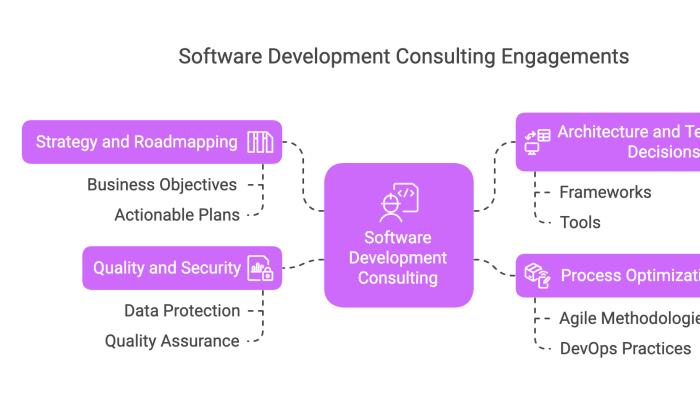

Why Do Businesses Rely on Consulting?
Modern companies face rapidly changing technological landscapes, evolving customer demands, and complex legacy systems that can be difficult to navigate internally. Software development consulting provides the strategic expertise needed to bridge these gaps. By leveraging external specialists, businesses can:
- Accelerate Product Launches: Expert consultants streamline development cycles, enabling faster time‑to‑market.
- Refine Agile Practices: With guidance on iterative methodologies, teams can improve their sprint cycles and delivery efficiency.
- Reduce Costs: Consulting helps minimize overhead by filling critical technical roles without the expense of long‑term hires.
- Integrate Cutting‑Edge Technologies: Consultants bring in the latest tools and best practices, ensuring your systems remain competitive and future‑proof.
- Modernize Legacy Systems: They offer fresh perspectives to re‑engineer outdated platforms, making them more agile and scalable.
This external expertise is particularly vital when internal resources are stretched thin or when specialized knowledge is required to solve complex technical challenges.
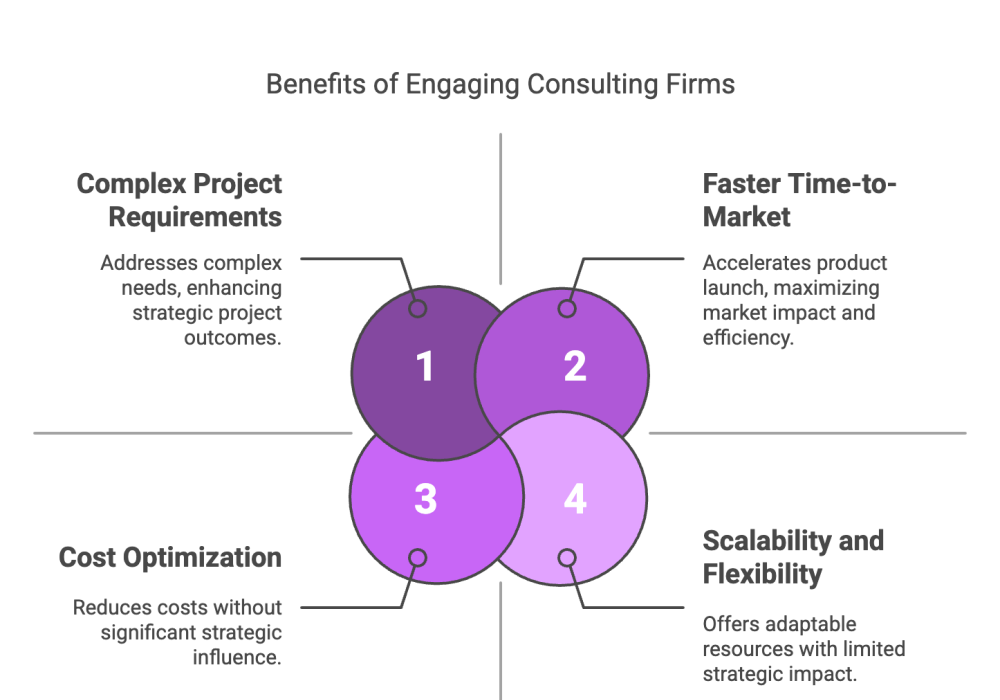

Engagement Models and Best Practices
Consulting engagements can be structured in several ways, depending on the project scope, duration, and specific needs of the organization. Common engagement models include:
- Project-Based Consulting: Defined scope with clear milestones and deliverables, ideal for one-off projects or system overhauls.
- Time-and-Materials (T&M): Flexible models where clients pay for actual hours worked, suited for projects with evolving requirements.
- Dedicated Team: A long‑term arrangement where a team of experts works exclusively on your project, fostering deep integration with your internal processes.
- Hybrid Models: Combining aspects of fixed-price and T&M engagements, offering both predictability and flexibility.
Best practices in consulting include setting clear objectives, maintaining transparent communication, and adopting agile methods that allow for rapid feedback and iteration.

Core Services Offered by Consulting Firms
Software development consulting firms typically offer a comprehensive suite of services designed to guide your technology strategy and execution. These core services include:
- Strategic Advisory: Consultants work with you to clarify your product vision, map out a technology roadmap, and set realistic goals. They often conduct stakeholder interviews and feasibility studies to ensure that the project aligns with your business strategy.
- Technical Architecture and Tooling: Expert guidance on choosing the right architecture patterns (e.g., microservices vs. monolithic), databases (SQL vs. NoSQL), and cloud platforms to ensure robust, scalable solutions.
- Custom Software Development: Hands‑on engineering services to build features, set up integrations, and manage third‑party components. This is particularly valuable if your internal team lacks domain‑specific expertise.
- Compliance and Security Consulting: Specialized services to ensure your software meets regulatory standards such as HIPAA, PCI DSS, or GDPR, including architecture audits and security monitoring.
- Embedded Solutions and Team Augmentation: Whether you need to integrate software into existing hardware or boost your internal team with specialized experts, consulting firms can provide both temporary and long‑term support.
These services are designed to not only deliver a high‑quality product but also to transfer knowledge and best practices to your internal teams for sustained success.
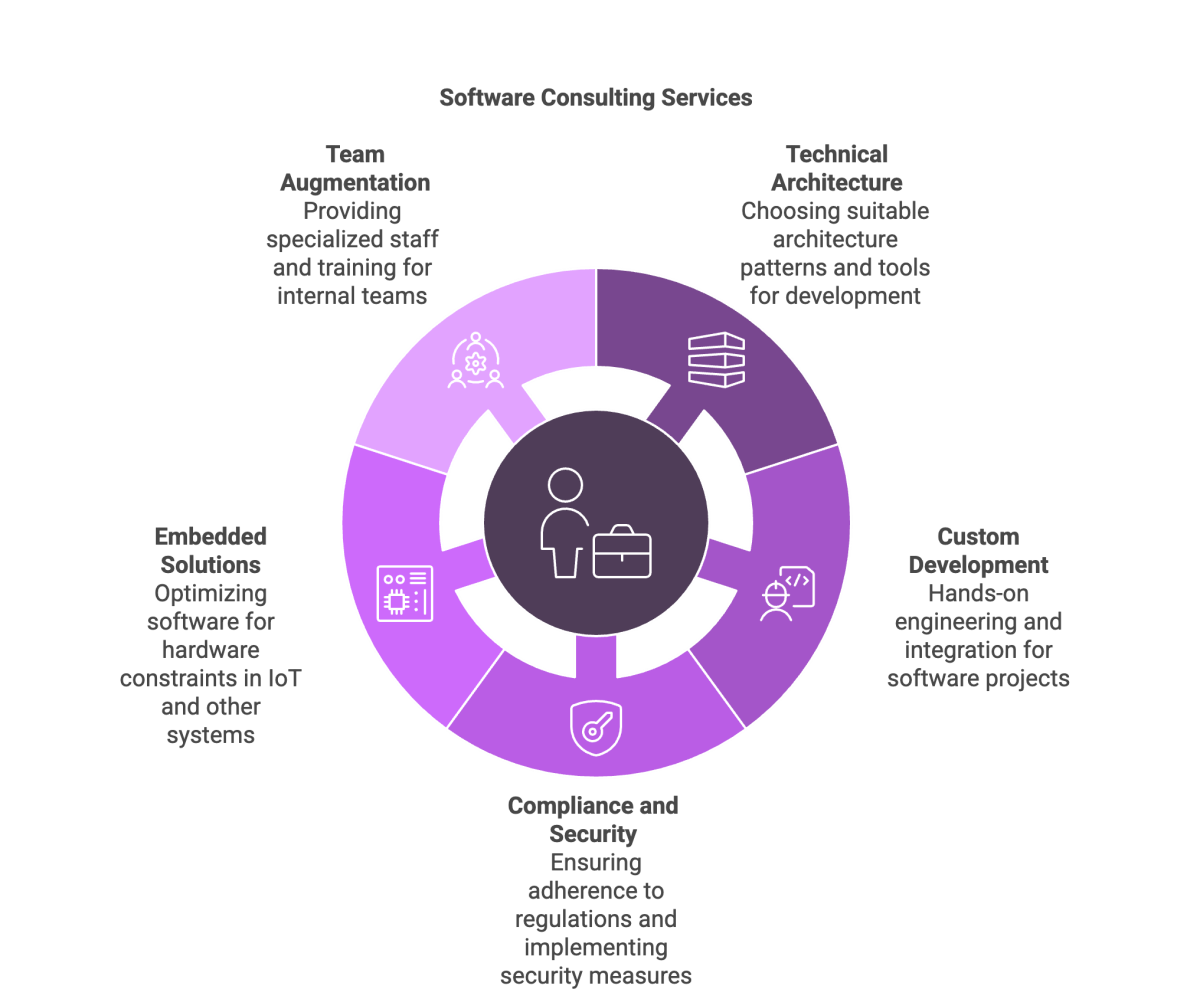

Selecting the Right Consulting Partner
Choosing the ideal software development consulting firm is critical to ensuring your project’s success. Key factors to evaluate include:
- Expertise and Portfolio: Look for a firm with a strong track record and case studies that reflect experience in your industry or with similar projects.
- Technical Skills and Stack Alignment: Verify that the firm’s technical expertise aligns with your project’s needs, whether it involves modern languages, advanced integrations, or specialized domains like AI or IoT.
- Communication and Collaboration: Effective consulting depends on clear, continuous communication. Ensure the firm demonstrates agile practices, offers regular updates, and maintains transparent project management.
- Security and Compliance: In industries where data protection is critical, confirm that the consulting partner adheres to strict security standards and compliance protocols.
- Pricing Transparency: Understand the engagement model—whether fixed-price, time-and-materials, or dedicated team—and ensure the pricing structure is clear with no hidden fees.
- References and Reviews: Direct feedback from previous clients can provide valuable insights into the firm’s reliability, quality of work, and post-deployment support.
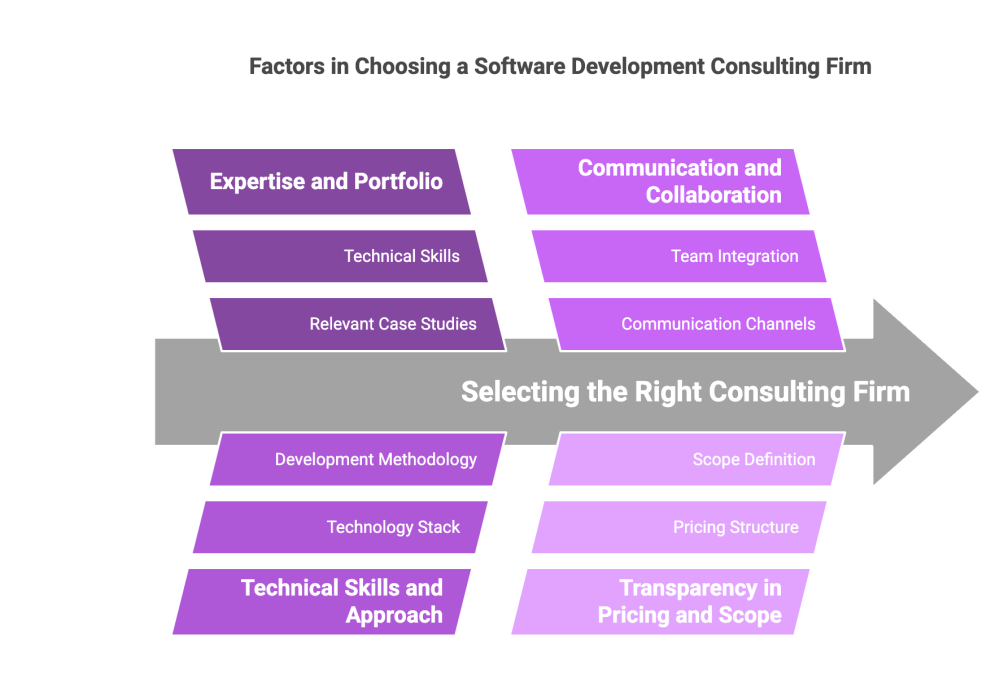

Avoiding Common Pitfalls in Software Consulting
Even the best consulting engagements can encounter challenges. Some common pitfalls include:
- Overemphasis on Tools vs. Strategy: A reputable consultant focuses on aligning technology with your business needs rather than pushing a specific tech stack.
- Underestimating Change Management: User adoption is as critical as technical implementation. Effective consultants incorporate user training and change management strategies to ensure smooth transitions.
- Unrealistic Timelines: Promises of rapid delivery without detailed planning can lead to quality issues. Transparent, well‑defined schedules based on iterative sprints are essential.
- Lack of Post-Deployment Support: Software needs ongoing maintenance, updates, and scalability enhancements. Ensure your consulting partner offers comprehensive post‑launch services.
By proactively addressing these pitfalls, you can maximize the value of your consulting engagement and secure a smooth path from planning to deployment.
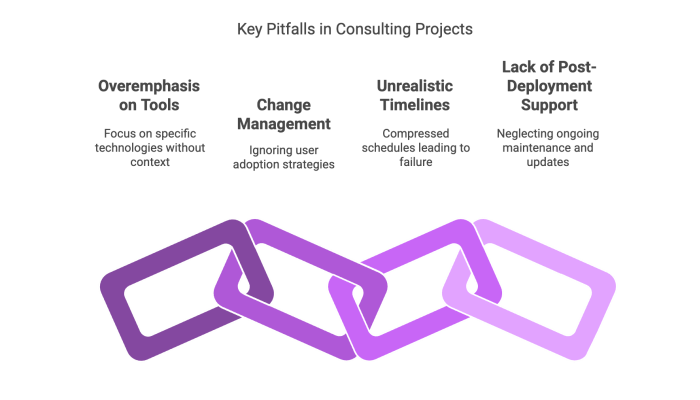

Frequently Asked Questions
Below are some common questions regarding software development consulting:
- What Is Software Development Consulting? – It is the process by which external experts guide and assist organizations in planning, developing, and implementing custom software solutions.
- Why Do Businesses Rely on Consultants? – Consulting firms provide specialized expertise, fill critical gaps, and offer flexible engagement models that help accelerate product launches and optimize processes.
- What Engagement Model Is Best for My Startup? – This depends on your project’s scope; fixed‑price models work for well-defined projects, while time‑and‑materials or dedicated teams are preferable for evolving requirements.
- How Can Consulting Improve My Agile Practices? – Consultants can help implement iterative sprints, regular stand‑ups, and continuous feedback loops to enhance development speed and product quality.
- What Are the Key Benefits of a Consulting Engagement? – Benefits include faster time‑to‑market, reduced overhead, access to specialized skills, and improved scalability, all of which contribute to a stronger competitive edge.
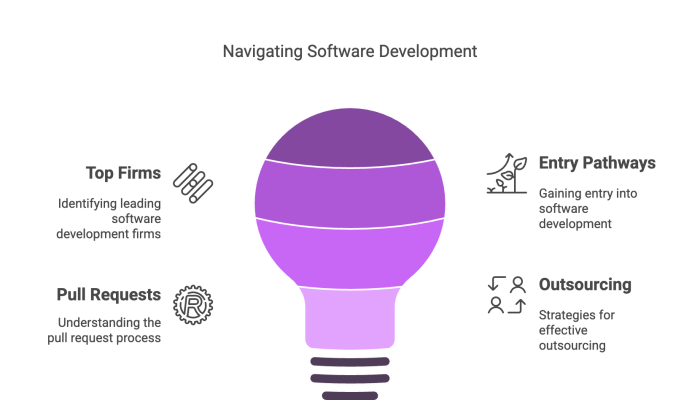

Conclusion
Software development consulting bridges the gap between technical demands and strategic business goals. By partnering with a knowledgeable consulting firm, organizations gain access to expert guidance, agile methodologies, and proven best practices that drive successful custom software projects. Whether you need to modernize legacy systems or launch a groundbreaking new application, consulting can streamline processes, reduce costs, and accelerate time‑to‑market.
A well‑chosen consulting partner not only minimizes development risks but also ensures that every phase—from strategy to deployment—is aligned with your long‑term objectives. In today’s competitive landscape, leveraging external expertise is essential for transforming innovative ideas into high‑performing, scalable software solutions.
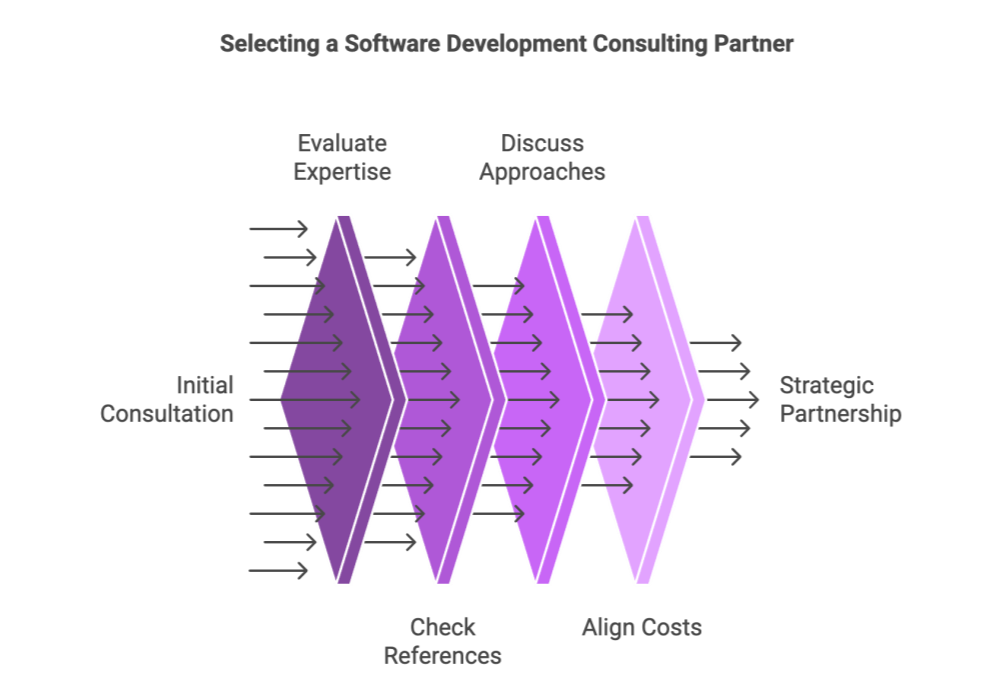

Get in Touch With Cognativ
If you’re ready to elevate your software development strategy with expert consulting that drives real results, contact us today. Our team is here to help you navigate technical challenges, implement agile solutions, and transform your business through tailored, high‑impact software development.
